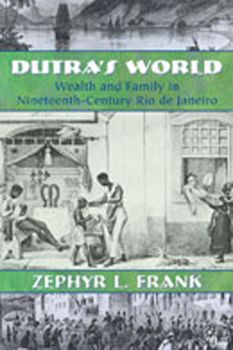Dutra's World: Wealth and Family in Nineteenth-Century Rio de Janeiro
Select Format
Select Condition 
Book Overview
The relation of slavery to Brazil's economic and social history has long fascinated researchers. Zephyr Frank focuses on nineteenth-century Rio de Janeiro, where almost half of the city's residents labored as slaves of diverse owners in a complex urban setting. Slavery persisted in the Brazilian city, in part, because it was entrenched among upwardly mobile entrepreneurs who hired their slaves out for wages, employed them in family businesses,...
Format:Paperback
Language:English
ISBN:0826334113
ISBN13:9780826334114
Release Date:October 2004
Publisher:University of New Mexico Press
Length:246 Pages
Weight:0.90 lbs.
Dimensions:0.7" x 6.0" x 9.0"
Customer Reviews
1 rating
Dutra's World
Published by Thriftbooks.com User , 16 years ago
Scholars have long noted the pervasiveness of slavery in the formation of Latin America. While sources typically privilege the social elites, less on average is known about the so-called "middling class". Zephyr L. Frank's 'Dutra's World,' a recent work on that very group, seeks to narrow that gap. Claiming roughly eighty percent of the free population in its corner, slaveholding pervaded all social levels. As an affordable and highly accessible form of property, Frank demonstrates that African slaves represented the only feasible road to social mobility. From 1820 to 1850, the author posits, a slavery-based economic and social order gave the middling class their best opportunity to acquire significant wealth and prosperity, regardless of their origins. However, the "ephemeral" moment of promise quickly collapsed after 1850. Unable to replicate its earlier success, the middling class nearly collapsed and lost much of its holdings to immigrants and, more importantly, the burgeoning economic elite. As a work of microhistory, 'Dutra's World' aims to illustrate the broad socioeconomic context of the "middle class" (for all purposes roughly categorized as an economic and hierarchical mid-level sort, though lacking group self-consciousness) primarily derived from analysis of estate records. The work's namesake, Antonio Jose Dutra, in many ways stands in for the class as a whole. Despite his birth as a slave, Dutra managed to acquire an impressive body of property in urban real estate and slaves within a generation. A barber by trade, Dutra's story, Frank suggests, indicates the diversity of experiences in mid-century Brazil. Economically successful by most accounts, those like Dutra typified the hardworking class most devoted to slavery. But unlike their elite counterparts, the over-reliance on slavery as an economic investment invariably stunted the middle class's ability to navigate the new economy. Propelled by the diversity of its transatlantic ties, the Brazilian socioeconomic situation exploded. Wages overall failed to keep pace with skyrocketing slave and urban real estate prices. To make matters worse, estate divisions in the middle class sector all but annihilated the group. In stark contrast, the economic elites typically improved their situations. Invested heavily in urban real estate, as opposed to slavery, elites weathered the slave trade's end without so much as a whimper. Forward thinking (economically speaking) and aggressive in its accumulation of wealth, the elite grew wealthier still, particularly when coffee exportation and railroads boomed in southeastern Brazil through the 1860s. Initially lacking any real domestic financial competition, economic elites survived long past their middling counterparts. In reconstructing Dutra's world, Frank relies on a rather impressive balance of archival and secondary sources. He rather elegantly contextualizes and sums extensive estate records in conjunction with recent li






